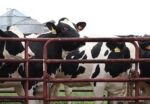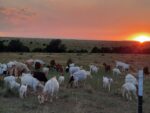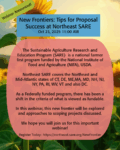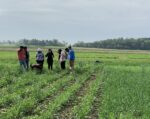Showing 21-30 of 445 results
 northeast.sare.org news 2026-farmer-grant-question-and-answer-sessions
northeast.sare.org news 2026-farmer-grant-question-and-answer-sessions 2026 Farmer Grant Question and Answer Sessions
Question and Answer Sessions for the 2026 Call for Farmer Grant Proposals are taking place from noon to 1 p.m. on Tuesdays in November.
Recordings from the sessions, along with questions/answers and links to referenced materials, are available
 northeast.sare.org news developing-an-affordable-soil-health-test
northeast.sare.org news developing-an-affordable-soil-health-test Developing an Affordable Soil Health Test
A recent Northeast SARE Research and Education project explored how small-scale farmers can better work with their soil. In LNE21-420, "Developing an Affordable Soil Health Test for the Appalachian Region to Incentivize Sustainable Agricultural Production", researchers from West Virginia University and University of Kentucky led by Dr. Eugenia Pena-Yewtukhiw from WVU worked with more than […]
 www.sare.org news fish-in-the-fields-increasing-the-sustainability-of-rice-farming-practices
www.sare.org news fish-in-the-fields-increasing-the-sustainability-of-rice-farming-practices Fish in the Fields: Increasing the Sustainability of Rice Farming Practices
University of Arkansas researchers are partnering with rice farmers in Arkansas to explore co-cultivating fish in flooded rice fields.
 www.sare.org news new-video-navigate-multigenerational-farming-with-communication
www.sare.org news new-video-navigate-multigenerational-farming-with-communication New Video: Navigate Multigenerational Farming With Communication
Working a farm with family can be a gift, and ownership transfer to successive generations requires intentional communication and understanding. At Flat Rock Dairy in Paulding, Ohio, dairy farmer Gretl Schlatter knows just how rewarding and complicated it can be to effectively manage a family business. “Farming is a great blessing and full of challenges,” […]
 western.sare.org news farmstay-website-helps-producers-profit
western.sare.org news farmstay-website-helps-producers-profit Farmstay Website Helps Producers Profit
Fifteen years ago, Western SARE awarded Oregon farmer Scottie Jones to develop a Northwestern Farmstay USA website. Today, the website highlights farms in 16 regions around the country and protectorates and includes 306 farms and ranches. What’s a farm stay? As part of her Farmer/Rancher project, Scottie defined a farm stay as overnight lodging on […]
 northeast.sare.org news new-frontiers-recording
northeast.sare.org news new-frontiers-recording New Frontiers - Tips for Proposal Success at Northeast SARE - Recording Available
The recording from the recent "New Frontiers - Tips for Proposal Success at Northeast SARE" webinar is now available. This meeting, hosted by Northeast SARE Regional Director Dr. Teresa Leslie, took place on October 23, 2025. It explains how grantmaking decisions at Northeast SARE are made, including our legislated priorities, and our emphasis on farmer […]
 western.sare.org news reducing-predation-in-multi-species-grazing
western.sare.org news reducing-predation-in-multi-species-grazing Reducing Predation in Multi-Species Grazing
New Mexico rancher Sydney Franz tested two approaches to kidding goats for economics and safety and found a clear winner. Sydney Franz moved her goat ranch, K&C Boer Goats, from central Texas to Mora County, N.M. to partner with Turner Ranches. Their dream was to establish multi-species grazing for land restoration and improved profitability. “In […]
 northcentral.sare.org news review-ncrsare
northcentral.sare.org news review-ncrsare Review Grants with NCR-SARE
Review grants with NCR-SARE.
 northeast.sare.org news new-frontiers-tips-for-proposal-success-at-northeast-sare
northeast.sare.org news new-frontiers-tips-for-proposal-success-at-northeast-sare New Frontiers: Tips for Proposal Success at Northeast SARE
The Sustainable Agriculture Research and Education Program (SARE) is a national farmer first program funded by the National Institute of Food and Agriculture (NIFA), USDA. Northeast SARE covers the Northeast and Mid-Atlantic states of CT, DE, ME,MA, MD, NH, NJ, NY, PA, RI, WV, VT and also DC. As a Federally funded program, there has […]
 northcentral.sare.org news apply-for-a-research-and-education-grant
northcentral.sare.org news apply-for-a-research-and-education-grant Apply for a Research and Education Grant
Preproposals are due December 4, 2025 by 4pm Central.